小升初英语专题考点讲解课件时态一般过去时
合集下载
(精品)小升初一般过去时(共16张PPT)
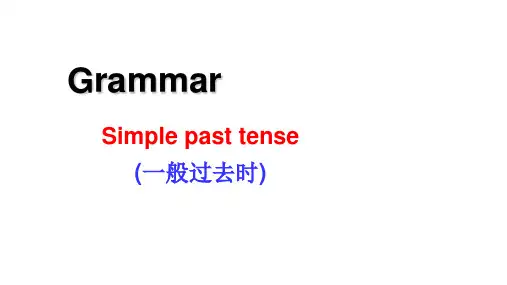
巧记不规则动词过去式
④过去式同原形:
cut(割)__put(放)____let(让)___ set(设置)______hit(击打)______ read(读)/_r_ed_/__ cost(花费)_____ hurt(伤害)____beat(战胜)_________
动词过去式转换练习
将下列动词变为过去式
肯定句
主语 + be动词的过去式(was, were)+其他 .
Eg.He was busy yesterday. 否定句
主语 + be动词的过去式(was, were)+ not+其他 .
Eg.He was not busy yesterday.
实义动词的过去时 :
肯定句 主语 + 动词的过去式 +其他 .
巧记不规则动词过去式
②过去式含有“a(o)ught”: teach(教)_t_a_u_g_h_t__think(想)__th_o_u_g__h_t buy(买)__b__o_u_g_h_t_bring(带来)__b_ro_u_g__ht catch(抓住)_c_a_u_g_h_t_fight(打架)__fo_u__g_h_t
“ 国 防 赛 事 ”发言 材料
作 为 这 次 参 赛30 名 选手中 唯一一 名非现 役军人 ,我倍感 骄傲与 自豪,因 为我 是国防 和 军 队 调 整 改革组 建的新 生力量 ——中 国人民 解放军 文职人 员中的 一员。 今年八 一 建 军 节 ,我 与全军 4567 名 新战友 一起向 军旗庄 严宣誓 ,我宣 誓:珍惜 军队荣 誉,献身
巧记不规则动词过去式
⑦过去式中含“ew”的: know(知道)_k_n_e_w__draw(画)__d_re__w___ blow(吹)_b_l_e_w___fly(飞) _f_le_w____ throw(投掷)_th_r_e_w__★show(展示)_s_h__o_w_e_d_
小升初英语语法复习课件:一般过去时
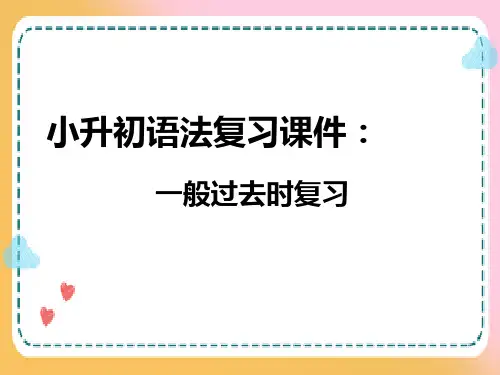
一、写出下列动词的过去式: play___p_la_y_e__d run__r_a_n______
make__m_a_d_e_____ go__w_e_n_t____
do__d_id_____ draw___d_r_an_k____ have_h_a_d______ sing _s_a_n_g____
read___r_e_a_d__ teach__t_a_u_g_h_t __
buy _b_o_u_g_h_t___ take_t_o_o_k___ stop__s_t_o_p_p_ed__ eat___a_t_e____
我会做
二、写出下列动词的正确形式:
1. He___li_v_e_d___ (live) in Wuxi two years ago. 2. The cat ___a_te____ (eat) a bird last night. 3. We___h_a_d__ (have) a party last Halloween. 4. Nancy___p_ic_k_e_d_ (pick) up oranges on the farm last week. 5. I___m_a_d_e__ (make) a model ship with Mike yesterday. 6. They__p_l_a_y_ed__ (play) chess last Saturday morning.
A.had
B.have
C.has
( C )6.Lily___to the beach with Tom last summer holiday.
A.goed
B.goes
C.went
( A )7.__the teacher___at this school last year ?
小学六年级下册英语小升初时态课件(通用版) 一般过去时总复习2
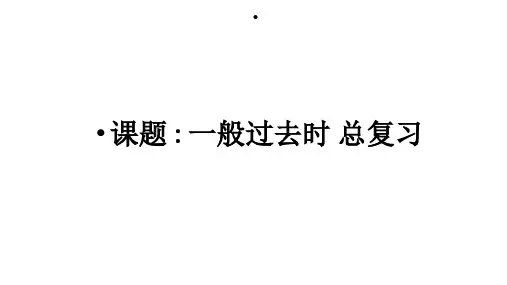
4.疑问was/were调句首
• Were you at home the day before yesterday﹖ • Was she happy this morning﹖
肯定回答 Yes, 主语+was/were. 否定回答 No, 主语+wasn't/weren't. Were Xiao Qiang and Xiao Long here just now﹖
• yesterday或以其构成的短语: • yesterday morning • yesterday afternoon • yesterday evening • the day before yesterday
three days ago
Miss Zhu went to Tiantian Market three days ago.
其他家族
Long long ago
yesterday Now
一般过去时 yesterday ago just now in the old days in those days in 1980 the other day at that time once upon a time
一般将来时
现在 进行
• 现在学过的常用的表示过去的时间状语有: just now,a moment ago,yesterday,last week,last night, last weekend,last year,last month,three days ago,two weeks ago,five years ago…
• (3)末尾只有一个元音字母和一个辅音字母的重读闭音节,应 双写末尾的辅音字母,再加-ed,如:stop-stopped, shop-
小升初语法复习英语时态概述Tenses(课件)通用版英语
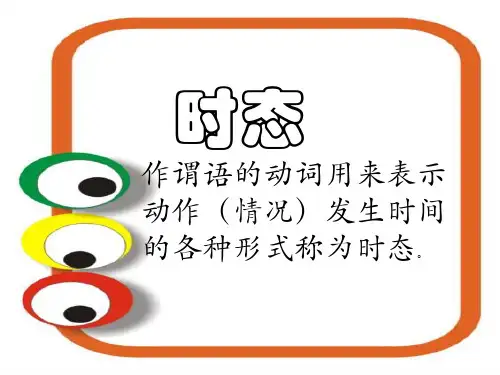
以辅音字母加y结尾的词 ,先变y为i, 再加-es,读/z/
例子
Play→plays leave→leaves swim→swims
pass →passes fix→fixes teach→teaches wish→wishes do→does
study→studies carry→carries fly→flies
基本结构:①be动词;②行为动词 否定形式:①am/is/are+not;②此时 态的谓语动词若为行为动词,则在 其前加don't,如主语为第三人称单数, 则用doesn't,同时还原行为动词。 一般疑问句:①把be动词放于句首; ②用助动词do提问,如主语为第三 人称单数,则用does提问,同时, 还原行为动词。
现在进行时
1.概念:表示现阶段或说 话时正在进行的动作及行 为。 2.时间状语:now, at this time, these days, look. listen 等时间状语做标志。
3.基本结构:主语+be +doing +其他 4.否定形式:主语+be +not +doing+其他 5.一般疑问句:把be动词 放于句首。
构成规则
例子
一般在动词原形末尾加-ed,(在清 look→looked
辅音后读/t/;在浊辅音和元音后读 play→played
/d/;在/t/,/d/后读/id/。
work→worked
结尾是e的动词在末尾加-d
like→liked live→lived hope→hoped
末尾只有一个辅音字母的重读闭音 plan→planned 节,先双写这个辅音字母,再加-ed stop→stopped
例子
Play→plays leave→leaves swim→swims
pass →passes fix→fixes teach→teaches wish→wishes do→does
study→studies carry→carries fly→flies
基本结构:①be动词;②行为动词 否定形式:①am/is/are+not;②此时 态的谓语动词若为行为动词,则在 其前加don't,如主语为第三人称单数, 则用doesn't,同时还原行为动词。 一般疑问句:①把be动词放于句首; ②用助动词do提问,如主语为第三 人称单数,则用does提问,同时, 还原行为动词。
现在进行时
1.概念:表示现阶段或说 话时正在进行的动作及行 为。 2.时间状语:now, at this time, these days, look. listen 等时间状语做标志。
3.基本结构:主语+be +doing +其他 4.否定形式:主语+be +not +doing+其他 5.一般疑问句:把be动词 放于句首。
构成规则
例子
一般在动词原形末尾加-ed,(在清 look→looked
辅音后读/t/;在浊辅音和元音后读 play→played
/d/;在/t/,/d/后读/id/。
work→worked
结尾是e的动词在末尾加-d
like→liked live→lived hope→hoped
末尾只有一个辅音字母的重读闭音 plan→planned 节,先双写这个辅音字母,再加-ed stop→stopped
人教版(PEP)小升初语法专题一般过去时课件
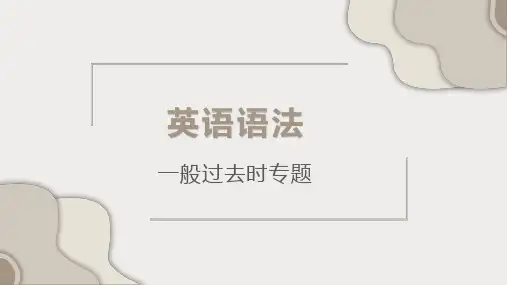
一般过去时的句式结构
1.be动词在一般过去时的变化及句式结构
• (1)肯定句:主语+be(was/were)+其他。 • I was happy yesterday. • They were tired last week.
• She wasn't at home an hour ago.
• 一般疑问句:Be(was/were)+主语+其他?
They w__a_s_h_e_d their car yesterday morning.
wash
3. Jack g_e_t_s_u_p_ at 8
every day.
He _g_o_t_u__p at 8
yesterday.
get up
4. The cat _s_le_e_p_s_ 20 hours every XXXday. He _s_l_ep__t 20 hours last XXXday. sleep
情况
规律
例词
1.一般情况
直接在词尾加-ed
play——played
2.以不发音的字母e结尾的词 词尾加-d
visit——visited move——moved
3.以“辅音字母+y” 结尾的词 把词尾的y 变i, 再加-ed
love——lived study——studied
4.末尾只有一个辅音字母的重 先双写结尾辅音字母,再加-
2. I painted this bookcase last XXXday.(变否变疑) I_d__id_n_'_t_p_a_i_n_t_t_h_is__b_o_o_k_c_a_s_e_la_s_t_X__X_X_ day. _D_i_d_y_o_u__p_a_in__t _th__is_b__o_o_k_ca_s_e__la_s_t_X__X_Xday?
小升初英语专题精讲第二十讲时态-一般过去时(超全精编版)课件
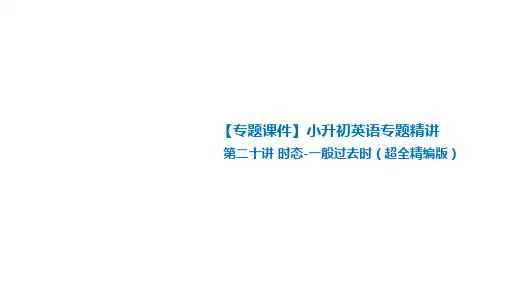
【专题课件】小升初英语专题精讲
第二十讲 时态-一般过去时(超全精编版)
新知导入
一、一般过去时的概念及作用 1.一般过去时表示过去某个时间产生的动作或存在的状态,常和表示过 去的时间状语连用。例如:
我妈妈的手提包刚才在沙发上。 My mother's handbag was on the sofa just now. 上周我们去了农场。 We went to the farm last week.
【解析】[分析]句意:孩子们正玩得愉快。原句为现在进行时。用last week(上周) 替换now以后要用一般过去时,last week放在句后。have的过去式是had,故答案为: The children had a good time last week. [点评]考察句型转换,辨认出last week用在一般过去时,注意动词have的变化。
一般过去时的构成:
课堂总结
1.be动词在一般过去时中的变化:am和is在一般过去时中变为was。are在一般过
去时中变为were。
带有was或were的句子,其否定式、疑问式的变化和is, am, are一样。即否定句在
was或were 后加not,一般疑问句把 was或were调到句首。
2、没有be动词的一般过去时的构成:在构成否定句及疑同句时一般都借助助动词
二、一般过去时的构成
新知讲授
1.be动词在一般过去时中的变化:
are在般过去时中变为were,用于第二人称和第一、第三人称的复数情况。
例如:
我们是新朋友。
We are new friends. 我们上周是新朋友。 We were new friends last week.
新知讲授
第二十讲 时态-一般过去时(超全精编版)
新知导入
一、一般过去时的概念及作用 1.一般过去时表示过去某个时间产生的动作或存在的状态,常和表示过 去的时间状语连用。例如:
我妈妈的手提包刚才在沙发上。 My mother's handbag was on the sofa just now. 上周我们去了农场。 We went to the farm last week.
【解析】[分析]句意:孩子们正玩得愉快。原句为现在进行时。用last week(上周) 替换now以后要用一般过去时,last week放在句后。have的过去式是had,故答案为: The children had a good time last week. [点评]考察句型转换,辨认出last week用在一般过去时,注意动词have的变化。
一般过去时的构成:
课堂总结
1.be动词在一般过去时中的变化:am和is在一般过去时中变为was。are在一般过
去时中变为were。
带有was或were的句子,其否定式、疑问式的变化和is, am, are一样。即否定句在
was或were 后加not,一般疑问句把 was或were调到句首。
2、没有be动词的一般过去时的构成:在构成否定句及疑同句时一般都借助助动词
二、一般过去时的构成
新知讲授
1.be动词在一般过去时中的变化:
are在般过去时中变为were,用于第二人称和第一、第三人称的复数情况。
例如:
我们是新朋友。
We are new friends. 我们上周是新朋友。 We were new friends last week.
新知讲授
小学升初中英语时态专题:一般过去时 全国通用版(共12张PPT)精品学习课件
Many young people have more opportunities to study abroad. Each coin has two sides. Studying abroad also has many disadvantages. For one thing, it will cost
要借助助动词 did 完成
1) 一般情况下,在动词原形后直接加 -ed。如:wanted, played。 2) 以不发音的字母 e 结尾的动词,直接加 -d。如:hoped, lived。 3) 重读闭音节单词需双写最后一个辅音字母,再加 -ed。如: stopped, shipped。 4) 以辅音字母 +y 结尾的动词变 y 为 i,再加 -ed。如:studied, worried。
(二)用词的适当形式填空。
1 They____(be) on the farm a moment ago. 2 There____(be)a shop not long ago. 3 Jenny____(not go)to bed until 11:00 o'clock last night. 4 Danny _____(read )English five minutes ago. 5 I _____(see)Li Lei ____(go) out just now. 6 He ____(do)his homework every day. But he __(not do)it yesterday. 7 When I was young, I _____(play)games with my friends. 8 When ____you_____(write)this book? I _____it last year. 9 Did he____(have) lunch at home? 10 I _____(eat) the bread, I 'm full now.
要借助助动词 did 完成
1) 一般情况下,在动词原形后直接加 -ed。如:wanted, played。 2) 以不发音的字母 e 结尾的动词,直接加 -d。如:hoped, lived。 3) 重读闭音节单词需双写最后一个辅音字母,再加 -ed。如: stopped, shipped。 4) 以辅音字母 +y 结尾的动词变 y 为 i,再加 -ed。如:studied, worried。
(二)用词的适当形式填空。
1 They____(be) on the farm a moment ago. 2 There____(be)a shop not long ago. 3 Jenny____(not go)to bed until 11:00 o'clock last night. 4 Danny _____(read )English five minutes ago. 5 I _____(see)Li Lei ____(go) out just now. 6 He ____(do)his homework every day. But he __(not do)it yesterday. 7 When I was young, I _____(play)games with my friends. 8 When ____you_____(write)this book? I _____it last year. 9 Did he____(have) lunch at home? 10 I _____(eat) the bread, I 'm full now.
小升初英语一般过去式讲解课件(共35页)
… went to + 地方
或: … went to the + 地点.
例:1)Where did you go on your holiday?
I went to Canada on my holiday. 2) Where did you go on your holiday? We went to the cinema.
回顾与思考?
1.一般现在时态标志词? ————————————————— ————————————————— 2.现在进行时态标志词? —————————————————— ——————————————————
二.动词过去式的构成
1. 规则动词
1)一般在动词原形末尾加– ed
look play start live hope use stop plan trip study carry looked played started lived hoped used stopped planned tripped studied carried
不含 be 动词的句型
一般过去时用来表示在过去的时间里发生的动作.
主语+动词过去式(+ed)+其它
பைடு நூலகம்
eg: 1)I went to work by bus yesterday. 2)you watched TV last night. 3)We played basketball last weekend. 4)They had lessons two days ago.
4.把i 变成o write→wrote写
sweep→swept 拖地 feel→felt 感觉
ride→rode骑(车)
小升初英语复习《一般过去时》课件
用一般过去时
昨天我拜访了我叔叔。
表示过去一段时间内经常 She often played computer games in 性、习惯性或反复性的动作 2018.2018 年她经常玩电脑游戏。
表示主语过去的特征或性格
She was a teacher. 她曾是一名老 师。
讲故事时用一般过去时
Long long ago, there was a tiger in the forest. 很久很久以前, 森林里有一只老 虎。
( )1. We have a picnic last weekend.
A
B
C
( )2. She visither grandparents last Sunday.
AB
C
( )3. My mother goes shopping every day when she was a young
A
B
C
girl.
—Did Lingling get up at 6:30 yesterday?
肯定回答:Yes, 主语+did. 玲玲昨天是 6:30 起床的吗?
否定回答:No, 主语
—Yes, she did. /No, she didn’t.
+did+not.
是的, 她是。/不, 她不是。
特殊疑问词+was/were+ 特殊 主语+其他Байду номын сангаас 疑问
1. B 2. B
单项选择。
( C )1.
you
your grandparents last weekend?
A. Did; visited
B. Does; visit
【通用版】小升初英语复习课件:一般过去时态
时
(时间) 现在
态
(状态) 一般
过去
将来
进行
完成
一般现在时态 现在进行时态 现在完成时态 一般过去时态 过去进行时态 过去完成时态 一般将来时态 将来进行时态 将来完成时态
一般现在时态 一般过去时态 一般将来时态
现在进行时态
The Simple Past Tense
一般过去时态
(表示过去发生的动作或情况)
just now, a moment ago, last…Байду номын сангаас…ago ……
用be动词的适当形式填空: 1. Liu Tao, where ______ are you? I_____ am here. 2. Liu Tao, where _____ were you just now? was in the computer room. I _____ 3. Where ______ were they last week? They _______ on the farm. were 4. Where ______ Nancy last night? was She _____ was in her grandparents’ home. And she______ still there today. is 5. Where ____ the cat? is It ____ was under the table a moment ago. But it____ is not there now.
There be 句型的过去时态
3. There be 句型的过去时态。 1)肯定句: There was a/an … There were some … 2) 否定句: There wasn’t a/an … There weren’t any … 3) 一般疑问句: Was there a/an …? 回答:Yes, there was / No, there wasn’t . Were there any …? Yes, there were. / No, there weren’t.
(时间) 现在
态
(状态) 一般
过去
将来
进行
完成
一般现在时态 现在进行时态 现在完成时态 一般过去时态 过去进行时态 过去完成时态 一般将来时态 将来进行时态 将来完成时态
一般现在时态 一般过去时态 一般将来时态
现在进行时态
The Simple Past Tense
一般过去时态
(表示过去发生的动作或情况)
just now, a moment ago, last…Байду номын сангаас…ago ……
用be动词的适当形式填空: 1. Liu Tao, where ______ are you? I_____ am here. 2. Liu Tao, where _____ were you just now? was in the computer room. I _____ 3. Where ______ were they last week? They _______ on the farm. were 4. Where ______ Nancy last night? was She _____ was in her grandparents’ home. And she______ still there today. is 5. Where ____ the cat? is It ____ was under the table a moment ago. But it____ is not there now.
There be 句型的过去时态
3. There be 句型的过去时态。 1)肯定句: There was a/an … There were some … 2) 否定句: There wasn’t a/an … There weren’t any … 3) 一般疑问句: Was there a/an …? 回答:Yes, there was / No, there wasn’t . Were there any …? Yes, there were. / No, there weren’t.
- 1、下载文档前请自行甄别文档内容的完整性,平台不提供额外的编辑、内容补充、找答案等附加服务。
- 2、"仅部分预览"的文档,不可在线预览部分如存在完整性等问题,可反馈申请退款(可完整预览的文档不适用该条件!)。
- 3、如文档侵犯您的权益,请联系客服反馈,我们会尽快为您处理(人工客服工作时间:9:00-18:30)。
Exercise
按要求完成下列句子。
1. Lucy did her homework at home.(改为否定句)
Lucy __d_id_n_’_t_ ___d_o___ her homework at home.
2. He found some meat in the fridge.(改为一般疑问句)
—Yes, we/you/he/she/they did.
—No, we/you/he/she/they பைடு நூலகம்idn't.
常用时间 常与一般过去时态连用的时间有: yesterday yesterday morning (afternoon, evening…) last night (week, month, year…) two days ago, a week ago, three years ago… in 1990, (in 1998…)
3. 也可以表示过去的习惯性动作。 My mother went to the park for a walk every day.
一般过去时的构成
1.含be动词的一般过去时: am/is—was are—were 肯定句:He was a cook two years ago.
They were at school yesterday. 否定句:He was not a cook two years ago.
Infinitive am / is are begin break bring build buy can
常见不规则动词
Past tense was were began broke brought built bought could
行为动词的一般过去式: a. 规则动词的变化规则: (1)一般动词直接加-ed (2)以e结尾的动词直接加-d (3)以辅音字母加y结尾的词,变y为i再加-ed (4)以重读闭音节结尾,词尾只有一个辅音字母,双写辅音字母加-ed
注:规则动词过去式的发音: 在清辅音后读/t/,在元音和浊辅音后读/d/,在辅音/t/,/d/后读 /id/。 b. 不规则动词变化需参看不规则动词表逐一熟记。
1. Xiao Lin went fishing this morning.(改为一般疑问句) 2. We visited our teacher last night.(就画线部分提问) 3. He had lunch at school.(改为否定句) 4. There was some milk in the bottle. (就画线部分提问) 5. He went to that city with his uncle. (改为一般疑问句)
__D_i_d__ he __f_in_d_ ___a_n_y_ meat in the fridge?
3. She stayed there for a week.(对画线部分提问)
__H_o_w__ __lo_n_g__ __d_id__ she _s_t_ay__ there?
That’s great!
4. The window was open and a bird D into my room. A. flies B. flys C. flyed D. flew
5. Both my parents C born in Tianjin and I born in Shanghai. A. are, am B. was, were C. were, was D. did, did
A. takes B. took C. gets on D. got on
2. I A some books about Amerian history from our library last week. A. borrowed B. took C. brought D. lent
3. It was warm, so I C my coat. A. put on B. put up C. took off D. take off
典型例题
— Your phone number again? I ___ quite catch it. — It's 69568442. A. didn't B. couldn't C. don't D. can't
答案:A。 本句虽没有明确的时间状语,但从语意上看出,在听的时候 没有听懂这个动作发生在过去,因此应用过去时。
2.行为动词的一般过去时: 肯定句:I/We/You/He/She/They went to England last year. 否定句:I/We/You/He/She/They didn't go to England last year. 一般疑问句:
—Did I/we/you/he/she/they go to England last year?
一般过去时
一般过去时的用法
1. 通常表示过去发生而现在已经结束的事件、动作或情况。 Sam phoned a moment ago. I got up at eight this morning.
2. 还可以表示刚刚发生的事情而没说明时间。 Did the telephone ring? Who left the door open?
4. There was some orange juice in the cup.(改为一般疑问句)
_W__a_s_ there _a_n_y__ orange juice in the cup?
单项选择。 1. He usually goes to school by bus, but yesterday he B a taxi.
They were not at school yesterday. 一般疑问句:—Was he a cook two years ago?
—Yes, he was. / No, he wasn’t. —Were they at school yesterday? —Yes, they were. / No, they weren’t.
